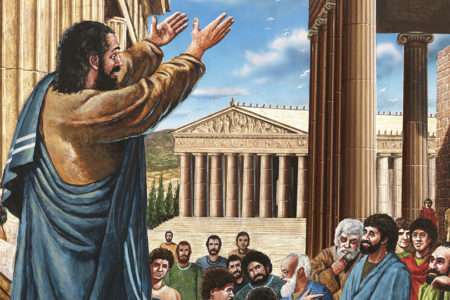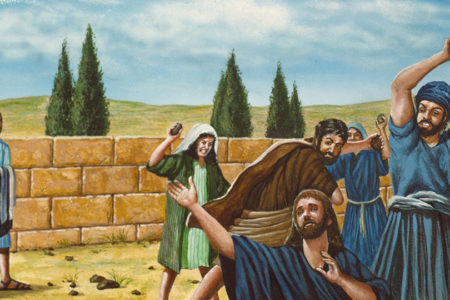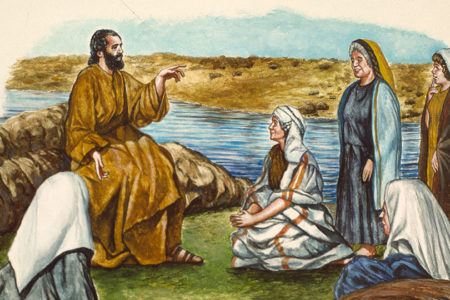Paul the Jew
This Jewish man called himself “the apostle of the Gentiles” (Rom. 11:13) and twice referred to his role as that of “a teacher of the Gentiles” (1 Tim. 2:7; 2 Tim. 1:11). He contended strongly for the full inclusion of Gentile believers in the fellowship of the Church on equal footing with Jewish believers (see Acts 15:1–29). More than anyone else, he is credited (or criticized, depending on your perspective) with opening wide the door for Gentiles to be saved and embraced as brothers and sisters in the family of God. Perhaps these actions have caused some to forget that the Apostle Paul’s background, heritage, and training were as Jewish as any could have been in the first century. In his simple statement, “I am verily a man who is a Jew” (Acts 22:3), Paul unashamedly declared to all his ethnic and religious identity. This Jewish identity needs to be emphasized afresh for a number of reasons.
First, Paul has been criticized by some Jewish writers and some higher critics as more Gentile than Jewish in his orientation. Some have even declared that although Jesus really began a good Jewish movement, Paul ruined it all by turning it into a Gentile church. In recent years, however, scholars have rediscovered and emphasized Paul’s thoroughly Jewish orientation.1 Still, attacks on his Gentilization of the Jesus movement continue to be heard.2
Second, with the growing Hebrew-Christian movement of our day, there must be a stronger emphasis on the Jewish roots of our faith. This is important for Jewish believers who need to feel that they are not foreigners in the community of the Messiah. It is also important for Gentile believers, who often do not realize the Hebraic contours of their faith. Although Paul would have argued for absolute freedom in Christ, he undoubtedly would be saddened to see Church members today who are totally ignorant of the Jewish context of the things they believe and do. To help remedy this Jewish absence from the Church, I offer this examination of Paul’s Jewish heritage.
The clearest summary of Paul’s Jewish background is found in the words he spoke on the steps of the Antonia Fortress to an angry mob: “I am verily a man who is a Jew, born in Tarsus, a city in Cilicia, yet brought up in this city at the feet of Gamaliel, and taught according to the perfect manner of the law of the fathers, and was zealous toward God, as ye all are this day” (Acts 22:3). By comparing this statement with other autobiographical references in his epistles, we discover three aspects of his Jewish background: his Jewish family, his Jewish education, and his Jewish zeal.
Family
Although Paul was born in Tarsus, a cosmopolitan city in modern Turkey, he came from strictly Orthodox Jewish parents, “Circumcised the eighth day, of the stock of Israel, of the tribe of Benjamin, an Hebrew of the Hebrews; as touching the law, a Pharisee” (Phil. 3:5). This family was descended from the ancient tribe of Benjamin, whose allotted portion of land was just north of the tribe of Judah and originally included Jerusalem. After the return from Babylonian exile, some of the children of Benjamin settled in the Jerusalem area (see Neh. 11:7–9, 31–36). It was probably from some of these Benjamites that Paul’s family traced its descent. The fourth-century biblical scholar, Jerome, stated that Paul’s parents came to Tarsus from the town of Gischala in the land of Israel.3
His parents’ choice of Saul as his Jewish name was undoubtedly associated with their tribal connection. Saul, the first king of Israel, was the most outstanding Benjamite in Hebrew history. This name was bestowed upon him at his bris—the ancient ceremony of the covenant of circumcision performed on the eighth day of his infancy.
Paul described himself as “an Hebrew of the Hebrews” (Phil. 3:5), meaning that he was born into a Hebrew-speaking family and imbibed that biblical language from his earliest days. The Book of Acts indicates that there were two ethnic/linguistic groups of Jewish people in the first century, Hebrews and Hellenists (see the conflict between these groups in Acts 6:1ff). Hellenists were Jews who spoke primarily Greek, whereas Hebrews were Jews who spoke primarily Hebrew (or Aramaic).
Although he was born in the Hellenistically sophisticated city of Tarsus and obviously knew the Greek language, Paul learned Hebrew from his parents’ mouths at an early age. Unlike most Jews in the dispersion, he was not dependent as a youth on the Greek translation of the Scriptures known as the Septuagint. Paul later told Agrippa that Jesus addressed him on the Damascus road “in the Hebrew tongue” (Acts 26:14). Furthermore, Paul had no trouble addressing the Jerusalem crowd in what was both his and their mother tongue (Acts 21:40; 22:2).
Education
Although he was born into an observant, Hebrew-speaking Jewish family, young Saul evidently did not spend much of his youth in the town of his birth. “Paul would have been given little opportunity of imbibing the culture of Tarsus during his boyhood: indeed, his parents made sure of an orthodox upbringing for him by arranging for him to spend his formative years in Jerusalem.”4
Returning to Acts 22:3, Paul said, “I am verily a man who is a Jew, born in Tarsus, a city in Cilicia, yet brought up in this city at the feet of Gamaliel, and taught according to the perfect manner of the law of the fathers, and was zealous toward God, as ye all are this day.” We cannot be sure at what age the youngster was sent to the Holy City, but certainly by his early teen years he was studying under the greatest rabbinic scholar of his age, Gamaliel. Rabbinic writings indicate that Gamaliel was the head of the great school in Jerusalem founded by his grandfather, the revered Hillel. He was one of a handful of Jewish scholars to be accorded the special honorific title, Rabban. Some sense of how he was regarded can be gained from the following statement: “When Rabban Gamaliel the elder died, the glory of the Torah ceased, and purity and separation died.”5
In the New Testament, Gamaliel appeared as a member of the Sanhedrin—the highest ruling body of the Jewish people. When the apostles were brought before this court for disobeying its directive not to teach publicly in the name of Jesus, the great Gamaliel rendered his opinion on their case: “Then stood there up one in the council a Pharisee, named Gamaliel a teacher of the law, held in reputation among all the people, and commanded to put the apostles forth a little space; And said unto them, Ye men of Israel, take heed to yourselves what ye intend to do as touching these men . . . And now I say unto you, Refrain from these men, and let them alone; for if this counsel or this work be of men, it will come to nothing; But if it be of God, ye cannot overthrow it, lest perhaps ye be found even to fight against God” (Acts 5:34–35, 38–39).
This temporizing policy was in accord with what we know about Gamaliel from his other statements recorded in the rabbinic writings. But if that was Gamaliel’s line, it certainly was not Paul’s! In most matters, the student was probably a faithful follower of his teacher. In one respect, however, he deviated from his master’s example: He repudiated the idea of a tolerant policy toward the Jewish believers. This will become evident when we later examine Paul’s zeal in attempting to annihilate every element of the Jesus heresy.
In this regard, there is a fascinating story, related in the Talmud, that may shed light on Paul and Gamaliel. While Rabban Gamaliel was teaching, one referred to only as “that student” contradicted him on at least three occasions. This unnamed student is cited as an example of “one who is impudent in matters of learning.”6 Since ancient Hebrew literature called Jesus “that man,” the words “that student” may well refer to Paul—the pupil of Gamaliel who went wrong and thus could not be mentioned by name. While we hold the apostle in much higher regard, it is interesting to recognize the impact his life and teaching must have left on the Jewish sages.
Zeal
Paul was no average student. He absorbed deeply the traditions and was fanatical about their observance. He testified to the Galatians that he “profited in the Jews’ religion above many my equals in mine own nation, being more exceedingly zealous of the traditions of my fathers” (Gal. 1:14). He acknowledged to his hearers that, as a result of his training, he “was zealous toward God, as ye all are this day” (Acts 22:3). He reflected back on his earlier days in this way: “as touching the law, a Pharisee; Concerning zeal, persecuting the church; touching the righteousness which is in the law, blameless” (Phil. 3:5–6). Because of his zeal, he was happy to be a part of the Pharisees, one of the half dozen Jewish sects active during the New Testament period. He testified before Agrippa, “My manner of life from my youth, which was at the first among mine own nation at Jerusalem, know all the Jews, Who knew me from the beginning, if they would testify, that after the strictest sect of our religion I lived a Pharisee” (Acts 26:4–5)
Although space here does not permit a discussion of the Pharisees, it should be noted that they were zealous for the oral traditions handed down over the centuries by scholars such as Hillel and Gamaliel. In other words, Paul cannot be explained away as a marginal Jew not familiar with his religion. He was part of-the strictest and most religious group—probably comparable to an ultra-Orthodox Hasid today.
His zeal for the traditions also manifested itself in an ugly way—a personal crusade to destroy the messianic movement among his brethren according to the flesh. He probably debated personally with Stephen in the synagogue of the Cilicians in Jerusalem (Acts 6:9), a place he undoubtedly frequented. This is supported by the fact that at the stoning of Stephen, young Saul was present and “consenting unto his death” (Acts 7:59–8:1). In other words, he had informed on Stephen to the Sanhedrin. It must have been with great pain that Paul later recalled the incident: “And when the blood of thy martyr, Stephen, was shed, I also was standing by, and consenting unto his death, and kept the raiment of them that slew him” (Acts 22:20). He also turned his misguided zeal against other Jewish believers: “And Saul, yet breathing out threatenings and slaughter against the disciples of the Lord, went unto the high priest, And desired of him letters to Damascus to the synagogues, that if he found any of this way, whether they were men or women, he might bring them bound unto Jerusalem” (Acts 9:12). Again, he reminded his Galatian readers, “For ye have heard of my manner of life in time past in the Jews’ religion, how that beyond measure I persecuted the church of God, and wasted it” (Gal. 1:13).
Conclusion
While it remains for another writer to describe the momentous event on the road to Damascus that radically altered this zealot’s life, one practical observation can be made. In the middle of the three chapters that are among the most Jewish in the New Testament (Rom. 9–11). Paul wrote with much feeling, “Brethren, my heart’s desire and prayer to God for Israel is, that they might be saved. For I bear them witness that they have a zeal for God, but not according to knowledge” (Rom. 10:1–2).
When Paul discussed misguided zeal, he knew personally about what he wrote. His thoroughly Jewish upbringing and education had undoubtedly equipped him with a knowledge of God and the Scriptures that prepared him for his future ministry. Unfortunately, it had also contributed to his fanatical hatred of Jesus and His followers. Only with an understanding of Paul’s intensely Jewish heritage can we fully appreciate the tremendous change that took place when he met the living Messiah while on a mission to destroy the followers of that very Messiah. His words to a young disciple say it all:
And I thank Christ Jesus, our Lord, who hath enabled me, in that he counted me faithful, putting me into the ministry, Who was before a blasphemer, and a persecutor, and injurious; but I obtained mercy, because I did it ignorantly in unbelief. And the grace of our Lord was exceedingly abundant with faith and love which is in Christ Jesus. This is a faithful saying, and worthy of all acceptance, that Christ Jesus came into the world to save sinners, of whom I am chief (1 Tim. 1:12–15).
ENDNOTE
- Consider, for example, Paul and Rabbinic Judaism by W. D. Davies, Fortress, Press, 1980.
- The following statement illustrates this caricature of Paul: “Christianity is the development of Paul and his theological descendants, who presented the pagans with a diluted form of Judaism in Hellenized garb” (The Jew and the Christian Missionary by Gerald Sigal, KTAV Publishing, 164).
- Jerome, Concerning Illustrious Men, 5.
- F. F. Bruce, Paul: Apostle of the Heart Set Free, Eerdmans, 1977, 43.
- Mishnah, Sotah 9:15.
- Shabbat 20b; see also the discussion in From Jesus to Paul by Joseph Klausner, 1944, 310-311.







